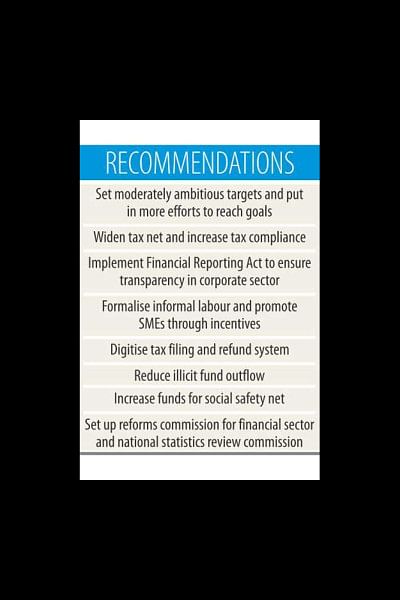Design realistic budget: CPD

The government should frame the budget for next fiscal year in a realistic manner as the highly ambitious goals laid out in the past several years could not be realised, the Centre for Policy Dialogue said yesterday.
“We have been recommending the same for the last several years. But this time, we are giving more emphasis because the difference between projections and implementation is rising,” said CPD Distinguished Fellow Debapriya Bhattacharya.
The CPD made the suggestions citing the budgetary targets and actual realisation between fiscal 2008-09 and 2015-16; the gap between the two has progressively risen.
For instance, a large annual development programme is always planned but the implementation invariably falls short, said Towfiqul Islam Khan, research fellow of CPD.
The design and implementation of the budget for fiscal 2016-17 must reverse this trend, the CPD said, while suggesting moderately ambitious targets and more efforts in attaining them.
The comments came at the unveiling of the independent think-tank's analysis, 'State of Bangladesh Economy in 2015-16 (Second Reading)' at a press meet at the CIRDAP auditorium in Dhaka.
The CPD also shared its recommendations for the upcoming fiscal year.
“The quality standard of the budget is a matter of great concern for us. It affects credibility, transparency and consistency of the budgetary initiatives,” Bhattacharya said.
Currently, the size of the budget is 17 percent of the country's gross domestic product, but it should be more for the sake of development of the nation.
But the major problem, he said, is in the resource mobilisation structure, citing the sluggish growth of income tax as a case in point.
In its proposal for the next fiscal year, the CPD suggested widening of the tax net, implementation of Financial Reporting Act and increased allocations for social sectors and social safety net schemes.
The widening of the tax base should be the topmost priority, it said, adding that other South Asian countries have comparatively higher tax efforts than Bangladesh.
Bangladesh manages to collect 50 percent of its potential tax revenue, which substantially below those of comparable economies such as Uganda and Vietnam.
The CPD also proposed the passage of a law against shadow owners of property to encourage voluntary disclosures of undisclosed wealth, curb the outflow of funds from the country and allow the use of the money in the economy.
Stringent punishment should be there for those who will not declare such assets even after the opportunity, Bhattacharya said, adding that income and properties should be brought under the legal structure.
Replying to a query on Panama leaks and the outflow of funds abroad, he said the government should have a committee to look into the matter.
“The CPD has been calling for actions to curb the illegal fund transfer for the last several years now. Otherwise, it will be an injustice to honest taxpayers,” he said.
The CPD also recommended for reforms in various areas, including the budgetary decision-making process and disclosure of financial accounts of state enterprises, to ensure transparency.
The financial accounts of the 29 state enterprises such as Bangladesh Petroleum Corporation and Bangladesh Jute Mills Corporation need to be made public in a transparent manner, it said.
It also sought transparency in the defence budget, saying the reporting mechanism for defence spending in Bangladesh is highly non-transparent.
Meanwhile, the independent research organisation has found the provisional GDP growth figure provided by Bangladesh Bureau of Statistics for the current fiscal year to be higher than expectations.
As per the provisional figures, growth will be 7.05 percent this fiscal year, up from 6.55 percent in fiscal 2014-15. But the elevation of GDP growth was not transmitted in other macroeconomic correlates, it said.
In the year that the 7 percent growth trap was finally overcome, the private sector investment declined, income tax growth slowed and the pace of employment generation did not make headway.
“Bangladesh has to come out of this contradiction,” Bhattacharya said.
Some 13.8 lakh jobs were created annually between 2003 and 2013, whereas a total of 6 lakh jobs were created between 2013 and 2015, according to the CPD.
“It is crucial that such acceleration in economic growth is accompanied by enhanced private investment and more quality jobs for the large young labour force of the country,” it said.
Mustafizur Rahman, executive director of CPD, said the quality of growth is important. “We need productive growth.”

 For all latest news, follow The Daily Star's Google News channel.
For all latest news, follow The Daily Star's Google News channel. 




Comments